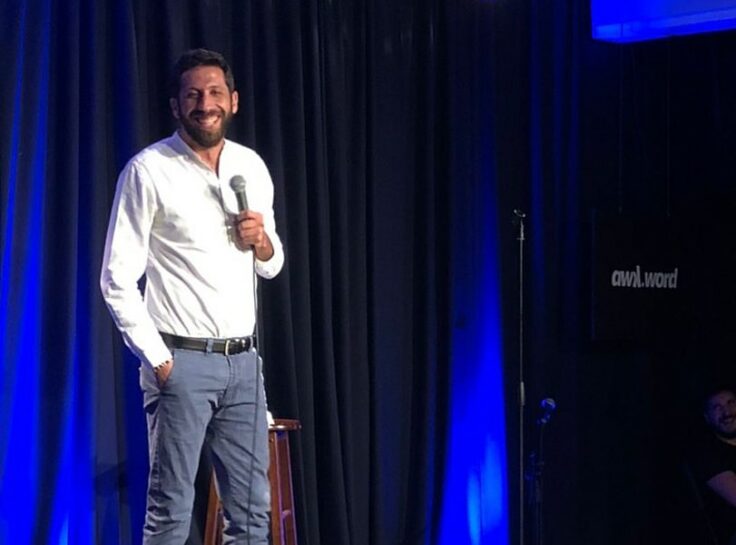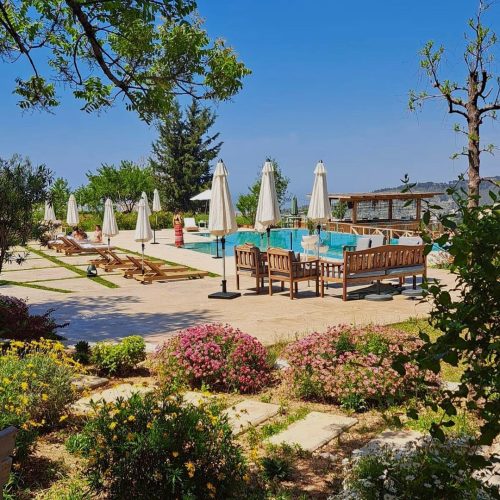For most people, realizing that you have a talent in a specific domain may seem obvious from the moment you start venturing the world on your own, but for others, it can stumble upon you in the most contingent of ways. Such is the case for Lebanese comedian, entrepreneur, and consultant, John Achkar, who inadvertently made an unexpected career out of humor while trying to raise money for a good cause.
“Comedy kicked off for me in 2011 when I was a boy scout leader and had to organize a fundraising campaign to take my group on a trip to Turkey,” Achkar told MILLE. “I rehearsed a quick monologue, went on stage, and people were like ‘We know you’re doing this for a fundraiser but we think that there’s something worth exploring, especially if you put some work into it.’”
Only six-years-later did he eventually take up their advice and decide to take the plunge into Lebanon’s stand-up comedy scene in 2017. Shortly after, things started picking up for him after Awk-Word, an underground stand-up comedy platform, launched in Beirut that provided an alternative route for comedians where they could be funny just for being themselves. “That’s when I officially started going to open mics and comedy club events. And then a video of mine went viral in 2020 and again the year after, and that’s when it got serious,” he explained.
The clip, which was the first-ever skit he recorded in English, garnered nine million views on Instagram and 11 million on TikTok. “Everything changed from there,” recalls Achkar. “My following jumped from 7000 followers to 80,000 and people all of a sudden started turning heads and began acknowledging whatever talent I had,” he added. “The funny thing is that it was my only-ever skit in another language than Arabic. After that, I started to post more often about how I joke— and in the language I actually do that in— and then luckily all of my shows sold out.”
In addition to touring in sold-out shows across Europe and the Middle East, Achkar has two comedy specials under his belt and has also featured in the first season of Stand Up-Baladi, where he doesn’t shy away from joking about his conservative Christian upbringing and traumatic airport experiences. More recently, he starred in Stand Up! Ya Arab! to open up about his journey and what it’s like to do stand-up in the Arab world.
However, as you may know, talent alone is not enough to stand out, and even more so when it comes to the world of the arts and culture (there’s a reason why recording is not allowed during amateur live performances.) Requiring a combination of talent, hard work, and a unique point of view, developing a distinct style and voice as a comedian and finding ways to differentiate yourself from others means honing your craft through constant practice and rehearsals, and most importantly, carrying a community-oriented approach to the industry as a whole.
“I don’t see the scene in Lebanon as a competitive one,” admits the comedian. “At this point, the most important thing right now is to build a culture of stand-up and that’s already a challenge in itself. When you go to New York, for example, you don’t pay attention to who’s on the lineup of performances. You just go to laugh, not to see who makes you laugh,” he explained.
“Traditionally, stand-up in Lebanon has been linked with performers rather than performance and that’s what we’re collectively trying to change right now. Places in Beirut like Awk-Word have actually started keeping the names of performers hidden for audiences to come only if they’re willing to laugh to and with anyone,” he continued.
The best comedy, of course, is always drawn from trauma. His story about his trouble with airport security, for example, spoke to an experience shared by millions of young Arabs across the world who have been “randomly selected” for extra security screening. However, the comedian notes that not everyone is going to relate to your stories all the time.
“Lebanon is such a great source of inspiration because there’s so much to talk about, but unfortunately it’s not going to resonate with everyone. It’s true, you might lose that sense of intimacy by being universal but you’ll lose audiences if you’re too region or country specific. Making sure that as many people as possible will understand your references and laugh has to be at the top of your agenda because if they don’t, you’re going to go against your own purpose. I think that’s something we in Lebanon have to deal with more as countries like the US don’t necessarily have to take this factor into account as their culture is so central and global,” the Dubai-based comedian said.
As he explains, being a professional comedian carries its own set of difficulties, and when experiencing hardships, having to constantly deliver laugh-worthy material can end up making things even tougher. Realistically, to make the cut, a joke must not only be funny, but also be relevant to the audience and the current cultural landscape of the location you are in. This means staying up-to-date with current events and trends, while being able to adapt your rhetoric accordingly. It also means being willing to take feedback and criticism, and constantly refining your prose to ensure that it resonates with your audience at all moments.
“I test my jokes a lot, all the time actually,” notes the stand-up comedian. “That obviously includes failing, but that’s how you tailor your skits. For me, it requires at least 10 or 20 times of testing before stringing a whole skit together. What also helps is touring, because some jokes land well in Beirut, but not necessarily everywhere I go in the region. And the same principle applies when performing in Europe and the Middle East. It can become complicated but it’s also a way of always reinventing yourself as you’re constantly writing, and therefore improving,” Achkar admits.
Set to bring his witty talents to the UAE on May 21 for the 2023 Dubai Comedy Festival, which runs from May 12-21, those who happen to be in the Gulf State in the upcoming weeks don’t want to miss Achkar’s performance at the theater in the Mall of the Emirates for the ultimate laugh.









